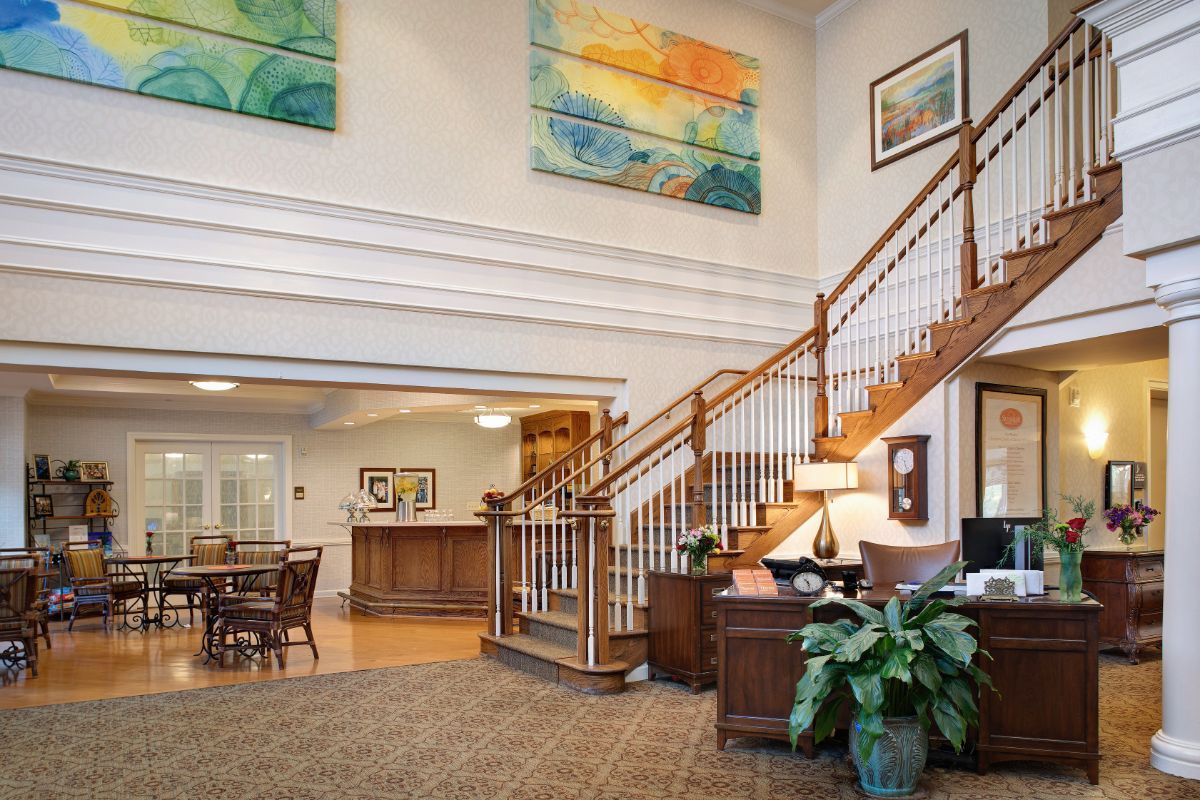The Impact of Personalized Memory Care on Mental Wellness
The Impact of Personalized Memory Care on Mental Wellness
Blog Article
All About Memory Care Solutions: Why Little Memory Treatment Homes Are a Terrific Option
Memory care solutions play an important role in sustaining people with Alzheimer's and dementia. Tiny memory treatment homes stand apart for their customized approach and intimate setting. With lower staff-to-resident ratios, these homes cultivate more powerful connections and tailored treatment. Homeowners take advantage of enhanced social communications and a safe environment. As family members explore options, recognizing the special advantages of tiny memory treatment homes comes to be crucial. What elements should be thought about when selecting the best home?
Understanding Memory Care Provider
While several might know with general elderly treatment choices, recognizing memory care solutions is necessary for families dealing with the obstacles of cognitive decrease. Memory treatment especially caters to individuals with problems such as Alzheimer's illness and various other kinds of dementia. These services provide an organized atmosphere that concentrates on enhancing the lifestyle for locals through specialized treatment and support.Memory care centers are developed to ensure safety and security and safety, often featuring protected settings to avoid roaming. Trained personnel are available all the time to aid with day-to-day tasks, medicine management, and personal treatment. Furthermore, memory treatment programs typically consist of cognitive stimulation tasks, customized to involve locals and advertise psychological health. Family members can take advantage of understanding these services, as they enable notified choices concerning their enjoyed ones' treatment, ensuring that their particular requirements and choices are attended to in a encouraging and compassionate manner.
The Advantages of Little Memory Treatment Residences
Small memory care homes offer unique advantages that can substantially improve the lifestyle for homeowners with cognitive impairments. One significant advantage is the intimate environment, which permits customized interactions among personnel and homeowners. This smaller setting promotes significant relationships, lowering sensations of seclusion and stress and anxiety usually experienced by people with memory issues.Additionally, the lower staff-to-resident ratio in small memory treatment homes allows caregivers to supply more conscientious supervision and support. This approach not just improves security but also promotes a sense of security for the residents.Moreover, tiny memory care homes can adjust promptly to the unique demands and preferences of each homeowner, enabling for a more homey atmosphere. Such an atmosphere can urge social involvement and involvement in tasks, inevitably improving the daily experiences of those coping with cognitive disabilities.
Personalized Care Program for Locals
Personalized care strategies are vital in memory treatment homes, as they deal with the special needs and choices of each homeowner. These plans start with extensive analyses performed by experienced specialists, who evaluate cognitive capacities, medical history, and individual passions. This tailored method assurances that care is not just reliable however additionally considerate of each individual's dignity and autonomy.Moreover, customized treatment strategies are adaptable, allowing adjustments as locals' needs develop gradually. This flexibility fosters a sense of protection and familiarity, which is necessary for people living with memory challenges. Caregivers are trained to apply these plans regularly, offering assistance that straightens with the homeowners' regimens and preferences.Ultimately, individualized care plans enhance the top quality of life for citizens by promoting health, involvement, and self-reliance, making them an essential element of memory care services in small memory care homes.
Creating a Home-Like Environment
Producing a home-like environment is critical for cultivating convenience and experience in memory care setups, as it substantially influences homeowners' psychological health. Little memory care homes commonly focus on tailored touches, such as warm color palettes, household photos, and acquainted furnishings plans, which help homeowners feel extra at simplicity. Incorporating aspects reminiscent of a standard home, like cozy space and communal locations, urges a sense of belonging.Moreover, making use of natural light and outside areas can boost the ambience, promoting relaxation and peace. Staff participants play a significant duty in preserving this setting by engaging with residents in a compassionate fashion, treating them like family members. Regular tasks, such as cooking or gardening, can also add to a home-like feel, supplying chances for homeowners to take part in significant experiences. Generally, producing a supporting atmosphere sustains cognitive feature and emotional security, making it an essential element of memory treatment solutions.
Enhanced Social Interaction and Community
Improved social communication and community are vital parts of memory treatment solutions. By cultivating customized social engagement and producing a family-like ambience, these solutions advertise significant links amongst homeowners. Group activities and events better motivate involvement, assisting people Recommended Site feel much more consisted of and sustained.
Customized Social Interaction
While social communication is important for overall health, several individuals with memory problems often have a hard time to engage meaningfully with others. Customized social engagement in memory care homes addresses this obstacle by producing customized activities that accommodate citizens' unique rate of interests and capacities. By concentrating on private preferences, caretakers can cultivate links that resonate deeply with everyone. Activities such as art treatment, songs sessions, and assisted discussions promote cognitive excitement and emotional expression. In addition, small group settings urge sociability and enable more intimate interactions, boosting feelings of belonging. This approach not just fights feelings of seclusion yet likewise equips residents to keep a sense of identity, inevitably adding to boosted psychological health and quality of life.
Family-like Ambience
In a memory care setting, fostering a family-like atmosphere greatly enhances social communication and constructs a feeling of community amongst residents. Smaller sized memory care homes typically prioritize intimate atmospheres, allowing citizens to form closer links with each other and personnel. This nurturing atmosphere promotes trust fund, which is important for people with memory problems. Locals are most likely to talk and share experiences, developing a supportive network that alleviates sensations of isolation. The experience of common rooms and routines adds to a sense of belonging, additionally urging social communication (personalized memory care). In such settings, emotional bonds thrive, resulting in boosted general well-being and a greater quality of life for citizens as they browse their daily experiences together
Group Activities and Events

Security and Security Features in Small Homes
Lots of small homes created for memory care incorporate vital security and security attributes to assure the health of citizens. These homes often use protected entrance and departure factors to avoid straying, a common problem among people with memory disabilities. Additionally, monitoring systems and alarm devices enhance surveillance, making sure that personnel can immediately react to any unusual activities.Interior formats are tailored for safety and security, with lessened risks such as clutter-free paths and sharp edges. Handrails and non-slip flooring are commonly mounted to reduce the risk of drops. Personnel are educated in emergency protocols, guaranteeing they are planned for different situations.Moreover, personalized care plans might consist of evaluation of private safety and security needs, giving tailored remedies for every citizen. Generally, these safety and security and safety attributes develop a caring environment where locals can prosper while keeping their dignity and self-reliance.
Exactly how to Select the Right Memory Care Home
How can families assure they choose one of the most suitable memory care home for their enjoyed ones? The decision needs mindful consideration of numerous elements. Initially, family members ought to review the facility's personnel qualifications and training, guaranteeing that caregivers are experienced in handling memory-related conditions. Next off, it's crucial to analyze the home's environment, concentrating on safety and security features and whether it cultivates a sense of community and belonging. Visiting the facility can offer understanding right into everyday activities and the social atmosphere, which are essential for psychological excitement and psychological health. Additionally, family members need to ask regarding the care strategies offered, ensuring they are tailored to individual needs. go to this website Thinking about the home's area and availability for household sees can contribute to a smoother shift. By addressing these facets, family members can make an educated choice that prioritizes their liked one's convenience and top quality of life in a memory treatment setup.
Often Asked Questions
What Qualifications Should Team Members in Memory Treatment Homes Have?
Personnel in memory care homes should have relevant accreditations, experience in mental read deterioration care, solid interaction abilities, and compassion. Continuous training in behavior monitoring and therapeutic interventions improves their capacity to support citizens effectively.
Exactly How Do Memory Treatment Services Differ From Typical Assisted Living?
Memory care services concentrate especially on individuals with memory impairments, supplying specialized support and organized settings. In contrast, typical assisted living provides general help with daily activities, doing not have the tailored technique needed for those with cognitive obstacles.
What Kinds of Tasks Are Supplied in Memory Care Homes?
Memory care homes commonly provide a range of activities created to engage residents. Usual alternatives include art therapy, songs sessions, cognitive games, physical workouts, horticulture, and get-togethers, all focused on improving health and cognitive feature.
Can Residents Bring Their Own Belongings to Memory Care Houses?
Residents can normally bring their own possessions to memory care homes, enabling them to individualize their space - personalized memory care. This practice aids produce a familiar environment, promoting comfort and a feeling of identity for the individuals

Just How Are Relative Associated With the Care Process?
Relative play an essential function in the care procedure, usually taking part in decision-making, attending treatment meetings, and supplying psychological assistance. Their involvement promotes a collaborative environment, enhancing the homeowner's overall well-being and lifestyle. While lots of might be familiar with general elderly treatment choices, understanding memory treatment solutions is crucial for family members encountering the obstacles of cognitive decline. These solutions give an organized environment that concentrates on improving the high quality of life for residents via specialized treatment and support.Memory care facilities are made to assure security and safety, typically featuring protected environments to protect against wandering. Individualized treatment plans are essential in memory care homes, as they cater to the one-of-a-kind requirements and preferences of each resident. Personnel participants in memory care homes ought to possess relevant certifications, experience in dementia care, strong communication abilities, and empathy. Memory treatment services focus specifically on people with memory disabilities, providing specialized assistance and organized environments.
Report this page